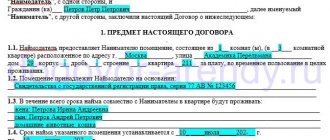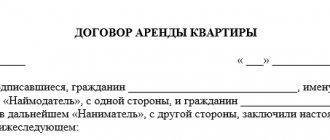Analysis of the situation step by step:
- Contract term
- Long-term employment contracts
- Registration of a long-term agreement in Rosreestr
- Actions of the tenant upon expiration of the contract
Typically, a rental agreement includes both a validity period and terms for the renewal of the agreement. At the same time, for a residential lease agreement, the term condition is not essential. If the term is not specified in the agreement, then such an agreement is considered to be concluded for five years (clause 1 of Article 683 of the Civil Code of the Russian Federation). We will talk about how to extend the term of the contract below.
Types of agreements allowing you to transfer an apartment for rent or lease
Renting an apartment is a transaction under which one counterparty (the owner of the premises) rents it out for living to another.
It is necessary to distinguish between:
- Commercial rental, when housing that is the private property of a citizen or organization is rented to an individual.
- Social hiring. The object in this case is a social housing premises. The parties to the transaction are a government agency or municipality and a citizen.
- Rent. In this case, the legal entity can only use the apartment for human habitation.
If the party renting the residential premises is a citizen, such a transaction is called rental and is governed by the provisions of Chapter. 35 of the Civil Code of the Russian Federation and Ch. 8 and 9 of the Housing Code of the Russian Federation. If such a subject is an organization, the transaction is called a lease and is regulated by the norms of Chapter. 34 of the Civil Code of the Russian Federation, as well as fundamental provisions on rent.
Rent and lease involve similar legal procedures for concluding and renewing agreements.
What to do if you rent an apartment and need to renew your lease?
October 13, 2014
Let us remind you what a rental agreement is. To do this, let's turn to the legislation. The essence of the definition boils down to the following: under a commercial lease agreement, the owner of a residential premises transfers to the tenant (tenant) an apartment for temporary residence for a fee (Article 671 of the Civil Code of the Russian Federation). Each contract includes essential conditions (those without which the contract will be considered not concluded) and non-essential ones. In our case, there are only two essential conditions: the subject of the contract and the payment for the premises. There are more unimportant ones: the term of the contract, the number of people living in the apartment, the procedure for paying utility bills (an agreement on who exactly will do this), the possibility of repairing the apartment, etc.
Extending the contract
Although the term of the contract is not essential, it is very important, and some nuances are worth paying close attention to. So, according to paragraph 1 of Art. 683 of the Civil Code of the Russian Federation, a rental agreement for residential premises cannot be concluded for a period exceeding five years. But if the period is not specified, the contract will be considered concluded for five years.
Important!
State registration of a residential lease agreement is not provided for by law, regardless of the term of the agreement.
The tenancy agreement may be short-term
(concluded for less than a year) and
long-term
(from a year or more).
In accordance with Art. 683 of the Civil Code of the Russian Federation, when concluding a short-term rental agreement, a number of restrictions apply to the employer:
- you cannot move anyone into the apartment;
- It is prohibited to rent out an apartment under a sublease agreement;
- there is no pre-emptive right to conclude a new contract after the expiration of this one;
- In the event of the death of the tenant or his departure, the contract terminates.
However, the above restrictions will cease to apply if opposite conditions are specified in the contract (for example, stipulating that the tenant has the right to rent out the premises under a sublease agreement).
As for the extension of short-term and long-term contracts, there are some nuances here.
Short-term rental agreement for residential premises
If you decide to renew your rental agreement, you must contact the property owner before the contract expires. If an agreement is reached between you and you continue cooperation, then it is enough to draw up an additional agreement in writing to the main rental agreement (clause 1 of Article 450, clause 1 of Article 452, Article 467 of the Civil Code of the Russian Federation).
Please note that if the total duration of the contract and agreement exceeds one year, such a contract ceases to be considered short-term. If this is not profitable for you, then indicate a new term in the additional agreement, for example, with the following wording: “The rental period under the contract is extended by eleven months from the date of signing the agreement (the end date of the initial rental period).”
If you have not agreed with the owner on the terms (for example, they increase your rent or offer to start paying for utilities yourself, but this does not suit you), or neither you nor the landlord informed each other about the desire to extend, then the contract is automatically terminated due to with the expiration of its validity period (clause 2 of Article 683 of the Civil Code of the Russian Federation).
Long-term rental agreement for residential premises
If you rent an apartment and have entered into a long-term contract, after its expiration you will have a pre-emptive right to conclude a new agreement (paragraph 1 of Article 684 of the Civil Code of the Russian Federation).
Keep in mind that the owner of the property is obliged to offer you to conclude a new contract (on the same or different terms) no later than three months before the expiration of the contract or to warn you that he does not intend to renew the contract due to the decision not to rent out the premises for rent (at the same time, he will not be able to rent out the apartment to other residents for a year). If he has not fulfilled this obligation and you have not refused to renew the contract, the contract is considered renewed under the same conditions and for the same period.
If the owner refuses to renew the contract with you due to a decision not to rent out the premises, and within a year from the date of expiration of the contract with you you learn that the apartment has been rented to another person, then in such a situation you have the right to demand recognition of such the contract is invalid and (or) compensation for losses caused by refusal to renew the contract with you. Such norms are enshrined in Art. 684 Civil Code of the Russian Federation.
If you decide to renew the rental agreement on the same terms, you do not need to notify the property owner about this. Except for the case when you decide to change the terms of the contract (for example, increase the number of people permanently residing in the apartment with you). Then with this proposal you must contact the landlord and enter into an additional agreement. Otherwise, the lessor has the right to terminate the contract due to the expiration of its term.
But if you have not agreed on the terms with the owner of the property, then the contract is terminated due to its expiration. In this case, the owner has the right to enter into a new contract with another tenant (Article 684 of the Civil Code of the Russian Federation).
In our article, we examined in detail some of the nuances of renewing an apartment rental agreement. Follow the recommendations of the law - and you will not have problems and reasons for worry. And we wish you that the next contract you enter into will be an agreement to purchase your own home.
Share
Tweet
Subscribe to Pravoweek News
Certificate of registration of media: El No. FS77-67462 dated October 18, 2016 Editorial telephone number,
How to renew an apartment lease agreement
According to Art. 683 of the Civil Code of the Russian Federation, an apartment rental agreement is drawn up for a maximum of 5 years. If the contract does not specify a term, it is regarded as concluded for the maximum possible 5 years.
In relation to rental transactions, there are no time restrictions. Based on the provisions of Art. 610 of the Civil Code of the Russian Federation, such an agreement is concluded for a period agreed upon by the counterparties in its terms. If this clause in the lease agreement is not agreed upon, the transaction is considered concluded for an indefinite period.
Extension of a lease or rental agreement for an apartment is possible:
- Through the execution of an additional agreement.
- By renewing the contract for a new period.
- By initially including in the main contract the terms on the procedure for its extension.
The duration of the contract depends on:
- the procedure for documenting the extension of rental housing;
- availability of the tenant/tenant's pre-emptive right to renewal.
Thus, based on Articles 621 and 684 of the Civil Code of the Russian Federation, the employer has the preemptive right to draw up an agreement for a new term. Only if the lease agreement is short-term (i.e., valid for less than a year), the condition on the pre-emptive right to re-negotiate does not apply (clause 2 of Article 683 of the Civil Code of the Russian Federation).
For reference: the term of the rental agreement is not an essential condition - accordingly, you don’t have to specify it. However, it should be remembered that in this case the lease agreement will be considered concluded for a 5-year period, and the lease agreement will become indefinite.
General provisions for changing the terms of contracts
Changes to the contract should be made by concluding an additional agreement to this contract. Moreover, in accordance with clause 1 of Art. 452, the agreement to amend the contract is concluded in the same form as the contract itself.
Changes to rental agreements - additional agreement to the rental agreement
If you rent out residential premises (for example, an apartment) to an individual , then you should enter into a rental agreement , the relationship under which is regulated by Chapter. 35 Civil Code of the Russian Federation. Accordingly, if you need to make changes, you will need to enter into an additional agreement to the rental agreement. An additional agreement to a rental agreement is drawn up in simple written form, and, like the agreement itself, it does not require certification by a notary or any registration.
Changing residential lease agreements - additional agreement to the lease agreement
If you rent out residential premises (apartment, room, house) a legal entity, then instead of a lease agreement you will need to enter into a lease agreement (read more about the differences between a lease agreement and a lease agreement). Here I would like to remind you that a lease for an apartment (or other premises) concluded for a period of more than 1 year is subject to state registration (clause 2 of Article 651 of the Civil Code of the Russian Federation). This means that an additional agreement to such an agreement must also be registered in the prescribed manner . Such additional agreement will come into force accordingly from the moment of its registration.
As for changes to lease agreements concluded for a period of less than 1 year , additional agreements to change the terms of such agreements are concluded in simple written form .
Once again, we draw your attention to the fact that neither the lease and rental agreements themselves, nor additional agreements to them, regardless of the terms of the agreements, require certification by a notary.
Possible reasons for changing contracts
The starting point for changing the contract can also be the terms of the contract itself. So, for example, in accordance with paragraph 2 of Art. 682 of the Civil Code of the Russian Federation, under a rental agreement (within its validity period), a unilateral change in the amount of payment is not allowed, except in cases provided for by law or agreement.
That is, if the contract clearly stipulates cases when the rent is changed unilaterally, then for such a change it will be sufficient to send a notification by the initiating party.
A similar procedure can be prescribed in contracts for changing conditions other than fees. But since we are talking here about the right to change unilaterally, all wording should be as clear as possible and not allow for double interpretation.
Conditions for the extension of the lease agreement, which may be specified in its text
A way to extend the period of validity of a short-term (i.e. concluded for a period of up to a year) contract is to include a prolongation clause in it. This condition assumes that if, before the end of the contract, neither party announces a desire to terminate it, the contract is considered extended under the same conditions and for the same period.
A transaction concluded for a period of up to a year, in accordance with Article 674 of the Civil Code of the Russian Federation, does not require registration of encumbrances. Meanwhile, when extending the contract using the method under consideration, the total time period of the contract will obviously exceed a year. What to do with registering an encumbrance under a lease agreement?
In fact, upon expiration of the initially agreed term of the contract, a new contract concluded on the same terms comes into force between the parties. Accordingly, if the automatic extension period is less than a year, registration of encumbrances is not required. In practice, some participants in civil law relations prefer not to take risks and simply renew the lease agreement for a new term, although you can do otherwise, simply without taking any action.
Extension of the social lease agreement
The legislation regulating legal relations regarding social rental housing does not contain any other means of extending the transaction other than renewing the contract for a new term (Article 91.9 of the Housing Code of the Russian Federation). The main condition in this case is the employer’s compliance with the criteria (clause 1 of Article 91.3 of the RF Housing Code), which allows the execution of such transactions.
If, at the end of the contract, the tenant ceases to comply with the conditions established by law, it is also possible to re-sign with him in the absence of third parties who have the right to formalize the transaction in question. In this case, the rental agreement is drawn up for 1 year.
Contract term
Standard samples of a rental agreement, as a rule, provide for a validity period of up to one year with the condition of automatic extension of this period if neither party declares an unwillingness to renew the agreement.
This is explained by the fact that standard templates are developed taking into account the most convenient conditions for citizens. So:
- contracts with a validity period of up to one year do not require state registration;
- the possibility of automatically extending the contract for the next year, in fact, starts the legal relationship anew, which means that registration of the landlord’s encumbrance with Rosreestr will not be required, even if the rental will last for decades in total;
- the possibility of automatic renewal gives both the employer and the lessor a certain guarantee of long-term legal relations;
- automatic renewal does not require additional registration, that is, no additional agreements are required.
If the contract does not provide for the possibility of automatic renewal, then the party interested in renewal will need to contact the other party with a proposal to extend the contract on the same or different terms.
If agreement is reached, it will be necessary to draw up in writing an additional agreement on the extension of the lease agreement (clause 1 of Article 450, clause 1 of Article 452, clause 1 of Article 674 of the Civil Code of the Russian Federation).
Care should be taken in the wording of additional agreements. For example, if in an additional agreement the condition for extending the contract is formulated in such a way that it provides for a change in the initial period specified in the rental agreement (for example, “the rental period is increased by seven months”), while the total period exceeds one year, such a contract ceases to be considered short-term and has some features, which will be discussed below.
At the same time, the tenancy agreement will remain short-term if it is extended by establishing a new tenancy period not exceeding one year by an additional agreement. For example, “the term of employment under the contract is extended by seven months from the date of signing this agreement.”
Addition to the contract
To correctly draw up an additional agreement to the Lease Agreement, the following is required:
- Pay attention to the number and date of the main Agreement.
- Indicate the date and place where, by whom and when the additional agreement was drawn up.
- Set all the items in the main document that you want to change or edit.
- Write which terms of the previous document you consider to be no longer valid.
- Accurately insert all the details of the parties: last names, first names and patronymics, passport details of the landlord and tenant, permanent registration addresses.
- It is worth mentioning the phrase: “the remaining terms of the Agreement are left unchanged.”
- Certify the document with signatures from both sides.
Tenant's preemptive right
It is worth considering: The priority for the renewal of mutual obligations of the owner and the tenant, the validity of which is one year or more, has the current tenant, if he regularly fulfilled the obligations under the concluded agreement of the parties.
This means: if you are a tenant of a living space under a long-term rental agreement, then at the end of its term, you will have the pre-emptive right to sign a new agreement. If the owner, having warned the tenant that he does not want to rent out the property in the next year, and contrary to statements, rented it out to another person, then the previous tenant can challenge the validity of the new agreement in court, declare it invalid and demand compensation for losses incurred.
Practice shows that the detailed and specified possible situations of relations between the parties, in the agreement and in additions to it, exclude double interpretation of the terms of the agreement in court. The landlord will feel calm if he knows for sure that the guilty party will be responsible for all the troubles that may happen to his property due to the fault of the tenant. The tenant, by regularly paying for accommodation and fulfilling all the stated terms of the contract, will be sure that the payment for housing will not unexpectedly increase, and the term of the agreement will not accidentally end.









